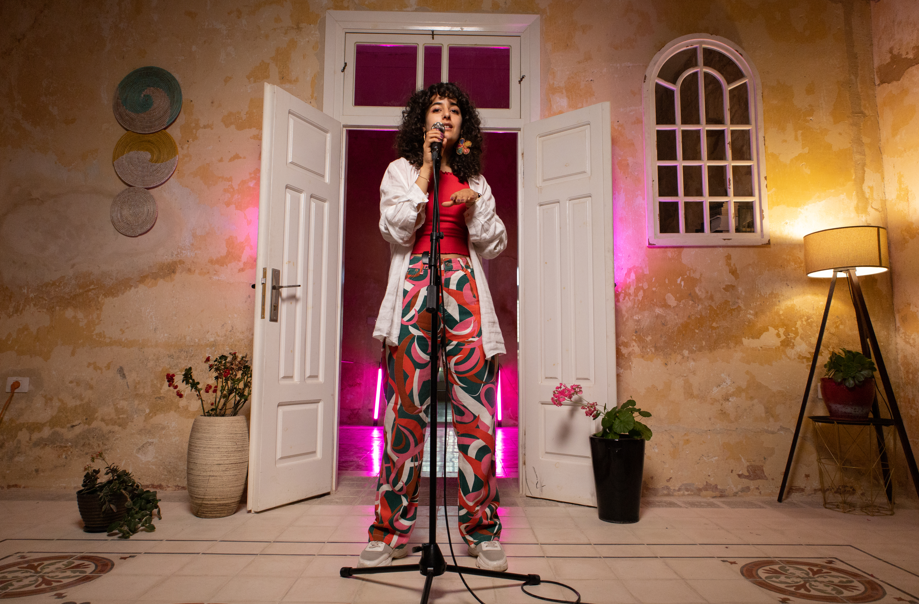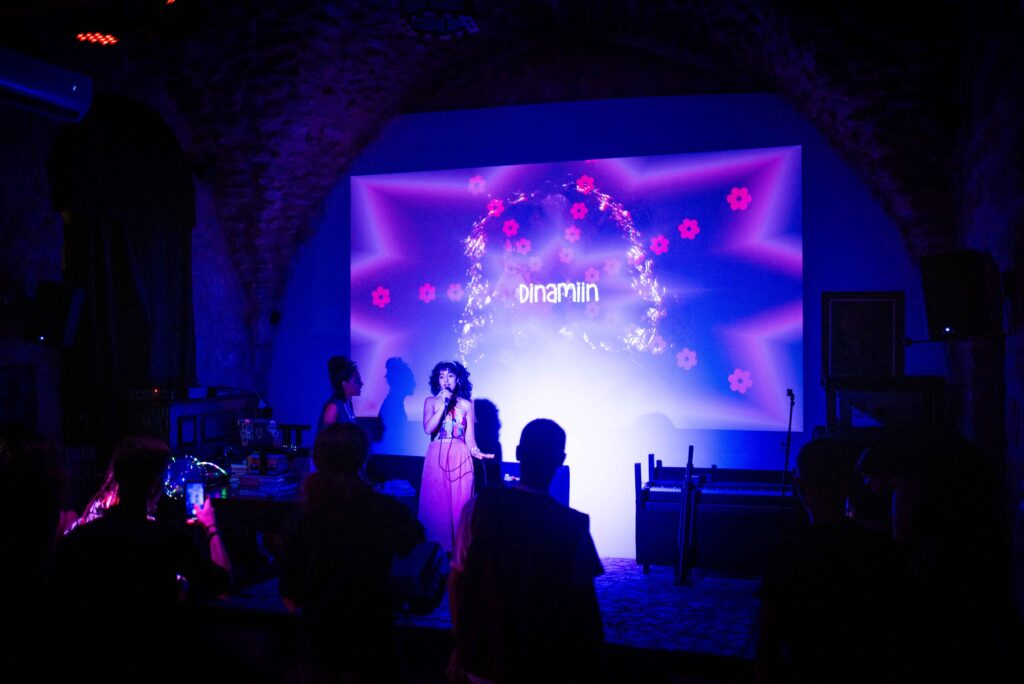"I Always Return to My Roots": 40 Minutes with Dina Amin

By: Layan Srour / Arab America Contributing Writer
Dina Amin is a Palestinian filmmaker and musician whose work explores identity, memory, and home. Rooted in her experiences growing up in Palestine, Dina blends documentary, experimental film, and genre-fluid music to tell deeply personal stories. Now based in Los Angeles, she continues to draw inspiration from her culture and values. Whether behind the camera or in the studio, Dina uses her art to reflect the beauty and struggle of Palestinian life—always staying true to her roots.
Can you tell us a bit about your upbringing and how it shaped your path into film and music?
I started working in film at the age of sixteen—that’s when I got my first internship at a radio/TV station, even though I didn’t yet know I wanted to pursue film. Ever since I was a kid, I have loved making videos of my family and friends. I got into documentary and experimental film when I moved to London to get my bachelor’s degree in film.
Growing up in Palestine, I listened to all kinds of genres, but I always wanted to create something of my own. I’d describe myself as genre-fluid. I don’t like being put in a box. I love R&B, Afrobeat, funk, and disco. I try not to limit myself to one style but instead express myself through whatever feels right in the moment. Music isn’t my profession, film is, but I keep music light and fun, a way to stay expressive when I’m stressed about film jobs!
How do you incorporate elements of Arab culture in your art?
With film, I mostly create Palestinian short documentaries. Right now, I’m working on an experimental film about women in male-oriented societies. I’m also writing a film about Palestine and what it means to be a woman living there. Through my work and my master’s program, I’ve realized that I always return to my roots, whether that’s through culture, tradition, or my hometown. I’m always talking about home. Most of my work centers on people and places, which, for me, is Palestine.
In music, I’m always expressing myself and talking about Palestine. My music, which I’ll be releasing soon, reflects a deep sense of homesickness. That feeling has grown stronger over the past two years, especially since the genocide. I can’t separate myself from my background, it’s who I am. I express myself through my Arab identity, and honestly, I don’t know if I would even be an artist if I weren’t Palestinian.
Is there a particular story, tradition, or even a person from your life or heritage that’s had a lasting impact on you? Something that continues to inspire your work?
A lot of my work is inspired by my grandparents, especially my grandmother. I made a short documentary about her journey—how she, as a Syrian, moved to Jerusalem at the age of eighteen and had to adapt to a completely new place. Her story is filled with nostalgia, homesickness, strength, and resilience.
Another strong influence on my work is powerful women. When I write, especially now, I’m deeply inspired by strong women. That’s what drives me to create characters who represent us. There isn’t enough representation of Palestinian women in film, and I want to change that. I want to show our perspective: Arab and Palestinian women’s perspective.
What do you hope your art communicates to your audience? Whether through film, music, or the space in between, what feelings or messages do you hope they walk away with?
The main message I try to convey through my work is that we’re not just victims. I want to show that we are normal people living full and meaningful lives. Palestinians aren’t defined only by occupation or by the Nakba. We’re people who are trying to create better lives for ourselves, our families, and our communities.
Something I’ve recently realized is how much I focus on personal growth. I’m here in the U.S. because I feel a sense of responsibility. I have the opportunity to speak up and to represent our voices. A part of me is always back home, which is why I keep going back. Yes, I’m in Los Angeles, but Palestine is always with me.
One of my old classmates once asked, “Why don’t you talk about the politics in your music?” But this song was about how I feel. I don’t have to explicitly say, “We’re Palestinians under occupation.” Just by being Palestinian, I’m already political.

How do you experience and perceive your Arab identity here in the U.S.? What kinds of challenges have come with it, and also what beautiful or empowering moments?
I feel like I’m always surrounded by my culture through meeting other Arabs and going to events, parties, events, and fundraisers. These events are great, but I still feel like I don’t belong here in America. I do face a lot of challenges in terms of culture. Ours is completely different than the American culture. The feeling of being left out makes me even more homesick.
Who are some of the biggest influences that have really shaped your creative path?
Elia Suleiman is a legend to me. He created a blend of satire and dark comedy about Palestinians. Watching his films for the first time was what truly inspired me to go into cinema. David Lynch is another major influence, especially for my experimental work.
When it comes to music, I love tarab artists like Umm Kulthum and Fairouz. Lately, I’ve been listening to more female Arab artists, like Felukah; she’s a huge inspiration! I try to listen to artists from Palestine, Egypt, or even Morocco, so I don’t limit myself to one sound or style.
What advice would you give to Arab Americans aspiring to enter the music world?
I try to think back on advice I would give myself: never stop, keep working on yourself, keep singing, making films, or whatever your medium of art is. Keep doing that. Don’t be discouraged because you didn’t receive an opportunity or fund. We’re going to get those bumps in the road, but do it anyway.
About the Article and Author: Layan Srour, a Lebanese musician based in Detroit, Michigan, is passionate about blending her culture through music, research, and education in the United States. 40 Minutes With is a weekly feature where Layan interviews an Arab American musician, exploring their journey through music and culture in America. Connect with Layan on Instagram, Facebook, LinkedIn, or via email.
Want more articles like this? Sign up for our e-newsletter! Check out our blog here!








